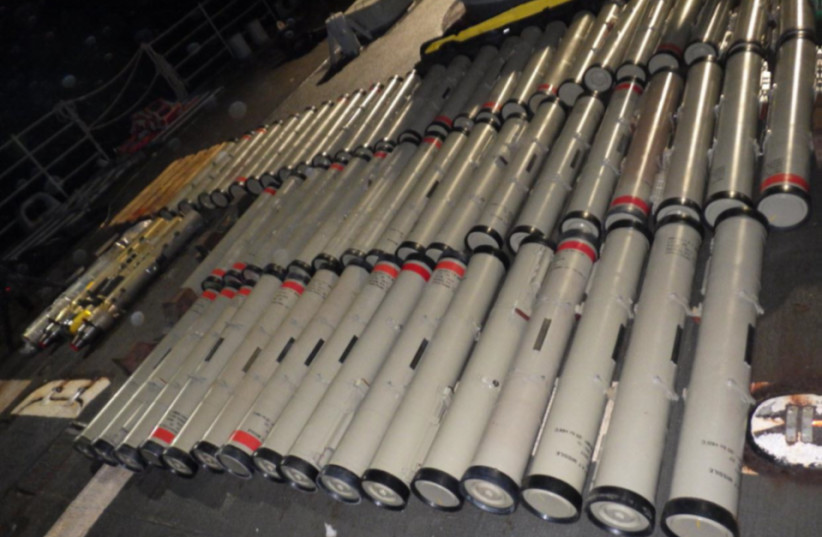The US Department of Justice successfully forfeited approximately 1.1 million barrels of oil and hundreds of missiles seized by the US Navy from several Iranian vessels in the Arabian Sea late in 2019 and early 2020, the US Department of Justice confirmed in an announcement on Wednesday night.
These represent the largest-ever American forfeitures of Iranian fuel and weapons to have been seized by the US government. Forfeiture of property – penalizing the owner for wrongdoing – allows the US government to take possession of and sell it.
The Islamic Revolutionary Guard Corps, which is alleged to have orchestrated the shipments, is designated as a foreign terrorist organization by the DOJ, which allowed for the seizures and forfeitures.
“The actions of the United States in these two cases strike a resounding blow to the Government of Iran and to the criminal networks supporting Iran’s Islamic Revolutionary Guard Corps,” said Assistant Attorney-General Matthew G. Olsen of the Justice Department’s National Security Division. “The Department of Justice will continue to use all available tools to combat the threats posed by terrorist organizations and all those who seek to harm the United States and its allies.”
The two weapons caches of eight surface-to-air missiles, 171 anti-tank missiles and thermal optics – as well as components for naval surface-to-surface cruise missiles, anti-ship cruise missiles, drones, and other missiles – were alleged by the DOJ to have belonged to the IRGC and were destined for Houthi militants in Yemen. The two flagless vessels, dhow sailboats, were raided on November 25, 2019, and February 9, 2020.
The DOJ announcement contains contradictions about the number of different types of missiles seized, in the opening sentence of the press release listing 171 surface-to-air missiles and eight anti-tank missiles.
“The illegal transfer of Iranian-made weapons poses a significant and immediate threat to our national security,” according to Kelly P. Mayo, director of the Defense Department's Defense Criminal Investigative Service. “The judgment announced today is an important step in our efforts to identify, disrupt and bring to justice those who imperil resources vital to our safety.”

Around July 2020, petroleum seizures of approximately 1.1 million barrels of petroleum products from four foreign-flagged vessels were also conducted in the vicinity of the Arabian Sea. The shipments were allegedly destined for Venezuela aboard the Liberia-flagged Bella, Bering, Pandi and Luna.
The US government sold the confiscated petroleum products for over $26 million, with part of the sales being directed to the US Victims of State Sponsored Terrorism Fund, which compensates American citizens who have been victims of international terrorism.
“These two cases demonstrate that not only can we disrupt the Islamic Revolutionary Guard Corps’ ability to finance its operations through petroleum sales, but we can also thwart its ability to use the proceeds of such sales to arm its terrorist proxies and export terrorism abroad,” said US Attorney Matthew M. Graves for the District of Columbia.
“Given our expertise and special statutory authority, the US Attorney’s Office for the District of Columbia is uniquely positioned to support its law enforcement partners in such terrorism cases," he said. "We are deeply committed to this mission.”
The surface-to-air missiles were Iranian-made Type 358, which according to Jane's were previously unknown until these seizures. According to court documents filed in August, all 171 anti-tank missiles were the Iranian-made Dehlaviehs. According to the Islamic Republic News Agency, they were indigenously produced and first introduced into service in the Iranian Army in 2015. The Ten Rayan Roshd Afzar RU60G thermal weapons optics are also Iranian-produced.
The US has imposed sanctions on oil exports of both Iran and Venezuela. Tehran has made several attempts to transfer oil to the country in South America's northern region. US sanctions on Iran are a key element of the negotiations for the Iranian nuclear deal that the Biden administration is attempting to reimplement.
